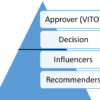In today’s fast-paced and competitive business landscape, traditional sales approaches are no longer as effective as they once were. To excel in modern sales, professionals need to adopt a Challenger Sales mindset. The Challenger Sales approach is not just a sales technique; it’s a transformative way of thinking about how to engage, persuade, and win over customers. In this blog post, we’ll explore the essence of the Challenger Sales mindset and why it’s crucial for achieving success in contemporary selling.
Understanding the Challenger Sales Mindset
Redefining the Role of a Salesperson
In the past, salespeople were often seen as information providers, responding to customers’ requests and needs. However, the Challenger Sales mindset challenges this passive role. It encourages sales professionals to take a more active stance, proactively educating customers about their needs, even when the customers themselves may not fully realize those needs.
Tailoring Insights to the Customer
Challenger Salespeople do more than just provide generic information about their products or services. They focus on delivering tailored insights that resonate with the customer’s specific challenges and goals. By offering unique perspectives, they position themselves as trusted advisors who can provide genuine value.
Constructive Tension
One hallmark of the Challenger Sales mindset is the ability to create constructive tension in the sales conversation. Instead of avoiding conflicts, Challenger Salespeople embrace them. They ask tough questions, challenge assumptions, and guide customers toward a deeper understanding of their own needs. This approach encourages customers to reevaluate their existing solutions and consider alternatives.
Embracing Continuous Learning
The Challenger Sales mindset recognizes that the sales landscape is ever-evolving. Sales professionals need to stay ahead of the curve by continuously learning and adapting. This involves staying updated on industry trends, understanding customer behavior, and refining their selling techniques.
Team Collaboration
Challenger Sales is not a solo endeavor. It emphasizes the importance of collaboration within the sales team and across departments like marketing and customer support. A cohesive, cross-functional team can provide a unified and consistent customer experience.
Why the Challenger Sales Mindset Matters
Increased Sales Performance
Studies have shown that organizations that adopt the Challenger Sales mindset tend to outperform their peers in terms of revenue growth. By focusing on value and challenging the status quo, sales professionals can close more deals and achieve higher sales quotas.
Enhanced Customer Relationships
Challenger Sales is not about pushing products; it’s about building lasting relationships based on trust and mutual benefit. Customers appreciate salespeople who genuinely care about solving their problems rather than just making a sale. This leads to stronger customer loyalty and repeat business.
Adaptability in a Changing Market
The Challenger Sales mindset equips sales professionals with the agility needed to navigate changing market conditions. In a world where customer needs and preferences evolve rapidly, the ability to challenge the norm and offer fresh insights becomes a valuable asset.
The Challenger Sales mindset is a game-changer in modern sales. It empowers sales professionals to be more than just transactional agents; they become strategic advisors who drive value for their customers. By embracing this mindset, sales teams can achieve higher performance, build stronger customer relationships, and thrive in an ever-changing marketplace. So, if you’re looking to elevate your sales game, consider adopting the Challenger Sales mindset – your customers will thank you, and your results will speak for themselves.










